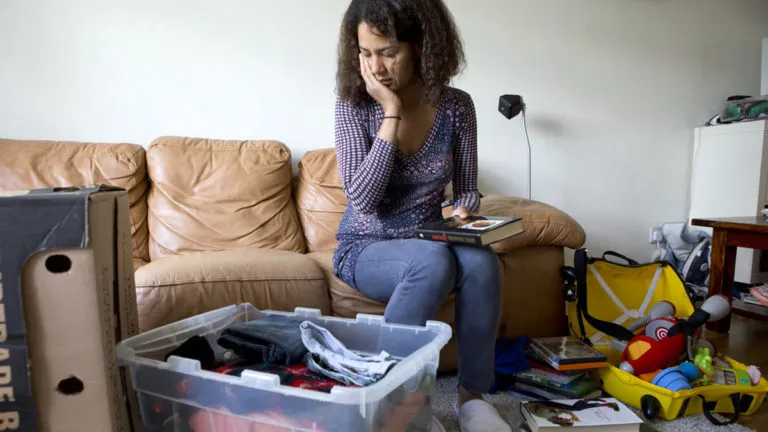Why the government needs to change the law on longer tenancies
Published: by Guest blog

Guest blog from Mind
Shelter has recently been talking about why the government should change the law to give all renters longer tenancies. In this guest blog from Mind, Charlotte Furber, policy and campaigns assistant, tells us how living in unstable housing can have a negative impact on our mental health and why Mind is also calling on the government to change the law to address this instability.
Housing is more than just a roof over your head. It’s about finding somewhere to call ‘home’ – somewhere that is safe and stable.
Right now, many people in the private rented sector can’t find a safe and stable home. Many of us are unsure of whether we’ll be allowed to stay after our six-month or year-long tenancy ends, or how much it might cost us to renew. And for those of us with mental health problems that can be particularly unsettling, taking a real toll on our mental health.
When we surveyed over 2,000 campaigners, Mind members and members of the public about their experiences of housing and mental health, we found that four in five people with mental health problems have lived in housing that has made their mental health worse. It also showed that two thirds of people with mental health problems have had at least one issue with the quality of their home. Over one in four told us a previous unstable tenancy had impacted their mental health. That’s a huge number of people whose stress could have been avoided if they had more power to fight for good housing, and know they can count on staying in the home they’ve found.
This instability can be addressed. But it requires a change in the law.
New Government proposals
The Government says that it is committed to: “delivering a fairer, good quality and more affordable private rented sector.” Mind agrees whole-heartedly with this aim. These new proposals are a significant step in the right direction, but now the Government need to follow through with real change.
The Government has suggested that tenancies should be a minimum of three years, but that they can be ended by either landlord or tenant after six months. After this six months has passed, the tenant can leave at any time, giving two months’ notice. Landlords, on the other hand, would have to follow eviction procedures to end tenancies before the three years. This takes the necessary step of putting power back into the hands of the renter.
In all types of housing, we’ve seen evidence that people with mental health problems are pressured into accepted poor deals, by unscrupulous landlords willing to exploit the most vulnerable. If these proposals are to effectively tackle this kind of behaviour they need to be enshrined in law – so that they become the norm, rather than just another option for those who feel confident enough to employ them.
To get the balance right, the Government must introduce new legislation to make these changes. We want to see the current proposals go further to protect people’s mental health in the private rented sector by giving them stability:
- Minimum tenancy lengths should be at least three years.
- If landlords want to end tenancies after the first six months, they should have to evidence reasonable grounds.
- Tenants should be able to give notice to end their tenancy at any time, and not have to wait until after the first six months.
- Rents should only be able to rise once a year, at a maximum of the inflation level. This should not be automatic, but require landlords to prove that this is a fair increase.
What might this mean for people with mental health problems?
This change could be extremely important for people with mental health problems. The knowledge that they can stay in their home for three years means people can feel more at ease in their space.
The private rented sector should provide the stability that many people are able to feel in social housing. In our 2017 research, Kirsty told us that her longer tenancy helped her to focus on her mental health: “I’m in quite an intense course of therapy that I waited two years to get on, and it, kind of, feels like this is a really good base to be able to now focus on recovery without having to worry about finding a place where I’m going to be in a couple of years. It’s like, that’s all sorted, that’s past, and now I can just focus on recovery which is really, really nice”.[1]
With longer tenancies, people can be confident that that they can keep seeing the same doctor and mental health professional, that they’ll be able to make friendships and links in the community. It could provide a much-needed change away from the cycle of worrying about where you’ll live from one year to the next.
For many people, it might mean an easier road to improving their mental health.
If you want to help ensure that all renters, like Kirsty, can benefit from longer tenancies, join our campaign and share your voice in the government’s consultation. You can read more about housing and mental health on Mind’s website.
[1] Mind (2017) Brick by Brick: A review of mental health and housing. https://www.mind.org.uk/media/17947884/20171115-brick-by-brick-final-low-res-pdf-plus-links.pdf